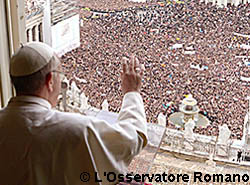

(ANS – Rome) – Pope Francis, in the space of a week, has already won people over. His secret? It would seem to go back to that first “good evening” last Wednesday from the balcony at St Peter's Baslica. Pope Francis has spoken of poverty, peace and mercy in these first few days; but there is another aspect to consider: his communication style.
Many people who work in the field including journalists have written up or spoken of the various episodes where Pope Francis has stepped outside of protocol and revealed some traits of his warm, simple personality, and especially his closeness to the people.
The content of his early addresses have been backed by a relational style; his appeals to peace, care for the poor, and mercy go without saying, and his gestures, his style of relating to people are admirable.
Communications theorists teach us that when a human being communicates he or she passes on information, whether it be content, message (what is said) or the relationship with the other (in other words “who I am for you and who you are for me”). When we communicate we send messages which we entrust not only to our words, which implicitly define and qualify the relationship we are aiming at.
The 'good evening' greeting on Wednesday 13 March, his “good morning” and the “have a good Sunday; eat well”, with which he began and finished the first Angelus on Sunday 17 March, are in fact quite complex messages that go beyond the content of his introduction; they frame what the Pope wanted to say. They are not liturgical greetings but warm and fraternal ones; they belong to a kind of communication amongst equals.
During his Angelus address, after referring to a book by Cardinal Kasper, he then put it in very amiable terms: “That book did me good but of course don't think I'm just advertising one of my cardinal's books!”. Here you find a brief personal sharing and a sense of fun.
When he spoke to journalists and other communicators on Saturday 16 March in the Paul VI auditorium, he revealed his sensitivity when at the end he said: “I have told you that I will bless you from my heart. Given that many of you do not belong to the Catholic Church, and others are non-believers, I shall impart this blessing from my heart, in silence, on each of you, respecting each one's conscience but knowing that each of you is a son or daughter of God. May God bless you”. Journalists who do not believe in Christ felt respected, but no one felt excluded.
Interesting too Pope Francis' behaviour on Sunday morning: at the end of Mass at Sant’Anna's parish church in the Vatican, the faithful saw his simple, warm style and then, leaving the church he greeted the people as would any good parish priest. Is this gesture not as powerful and effective as any liturgical one?
What strikes one is how he says things. This is why we can listen to the new Pope for what he says through his ordinary and extraordinary magisterium, but at the same time for how he communicates it.
Published 19/03/2013
